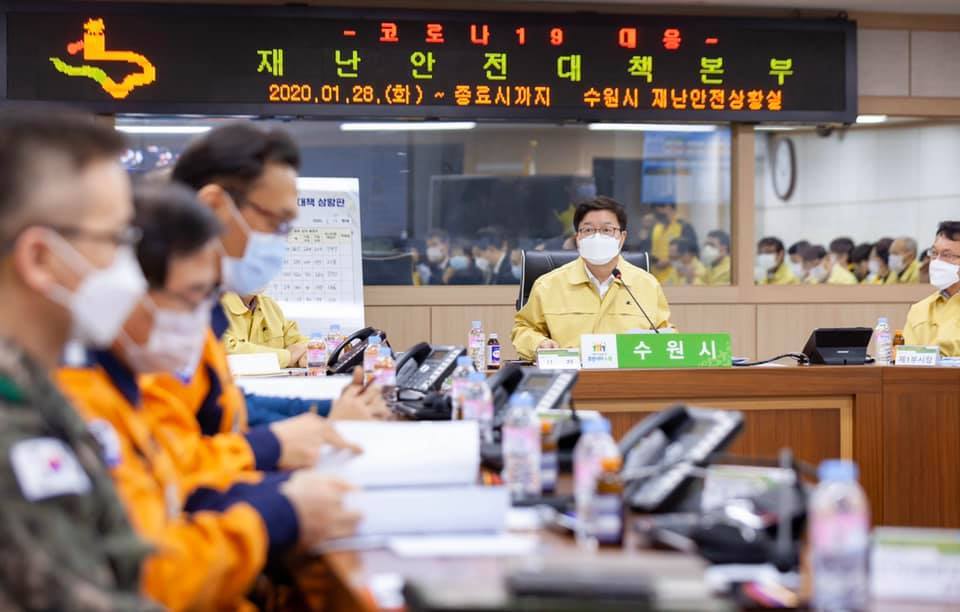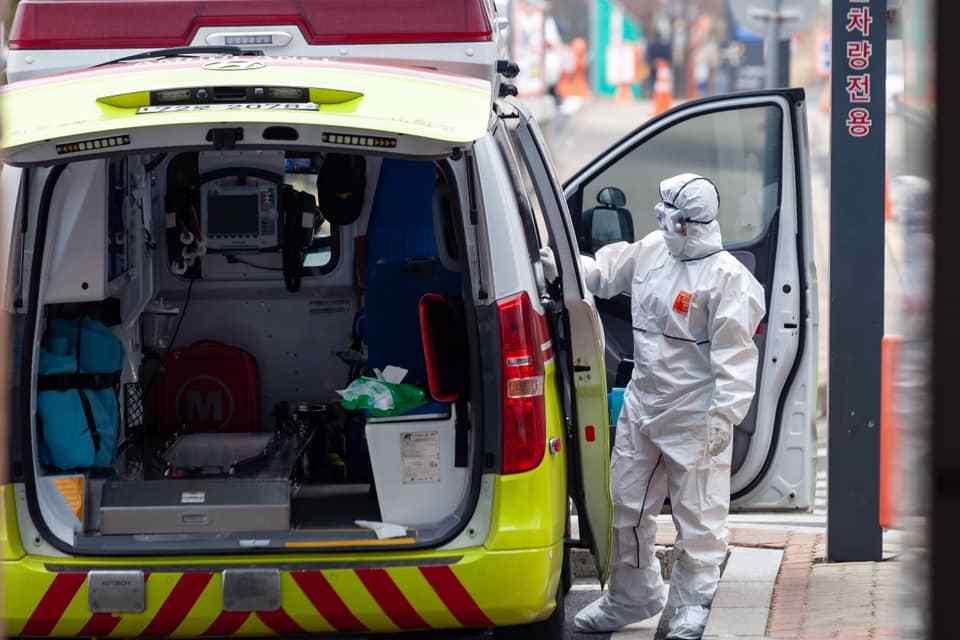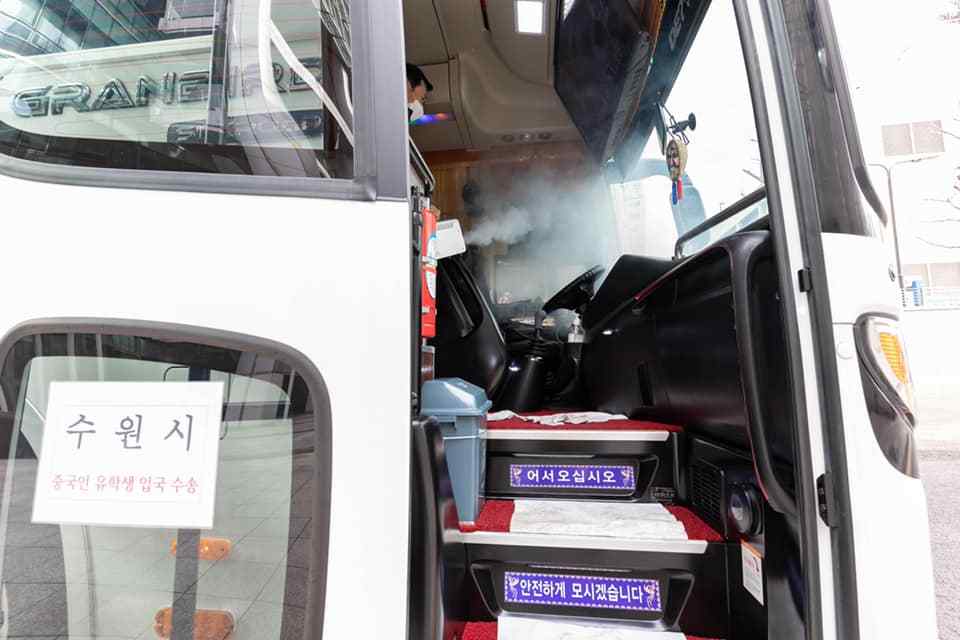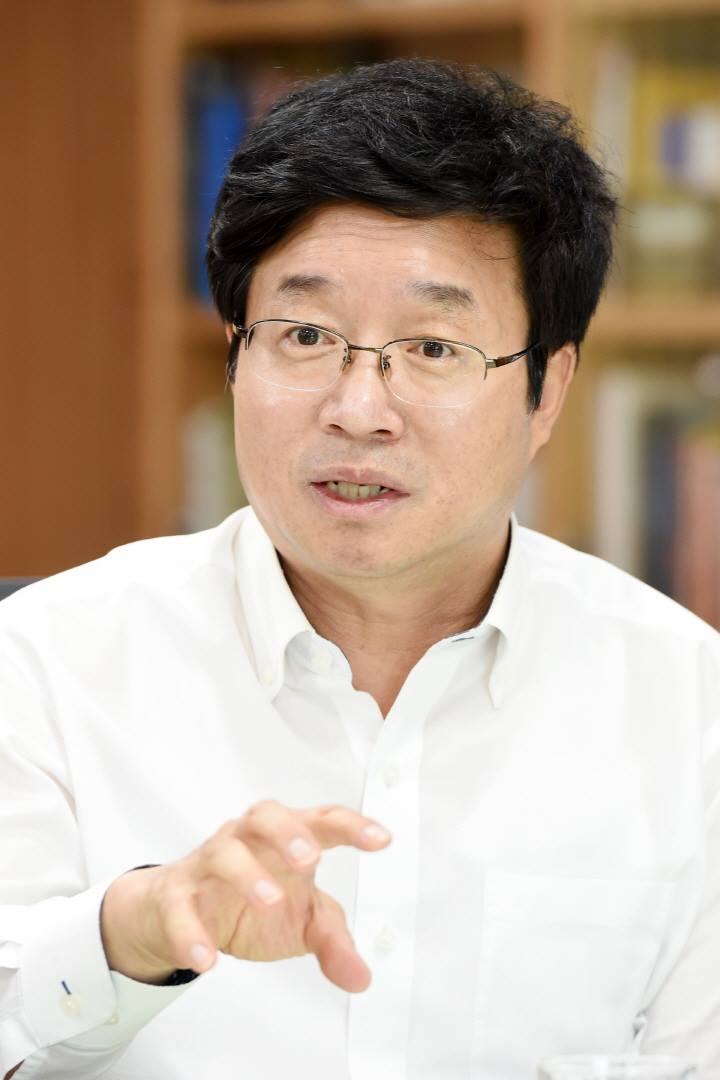 |
Suwon Mayor Yeom Tae-young attends an emergency meeting held at the Disaster and Safety Countermeasures Headquarters on Jan. 28. |
Suwon Mayor Yeom Tae-young‘s response to the novel coronavirus outbreak became notable early on.
Yeom was quick to recognize the gravity of the situation even before the Lunar New Year holidays. While others remained slow to take action, Yeom posted real-time news and set up action plans regarding a potential COVID-19 outbreak via his Facebook account. His action attracted attention from 226 local governments across the country.
The mayor believes in the power of a positive “overreaction.” Social media news alerts were sent out after the Suwon emergency meeting on Jan. 22, and the number of alerts has reached 110 since then. They have been sent to 400,000 followers of the Suwon Kakao Plus Friend account.
A COVID-19 notice board was established on the city of Suwon’s official website. About 1.25 million Suwon citizens have their eyes on Mayor Yeom’s social media notices, which have proven faster than some broadcast news. The city discloses detailed information and the travel histories of confirmed patients, people under active monitoring and those under self-quarantine.
 |
A quarantine official disinfects an ambulance in Suwon. |
Yeom didn’t just rely on the central government. “Perfect communication and positive overreaction” was his philosophy for preparing countermeasures. Yeom’s COVID-19 response was largely helped by his manual, titled “Ilsungrok,” which he wrote after experiencing the Middle East respiratory syndrome epidemic in 2015.
When residents of Jincheon and Asan protested against housing Korean evacuees from Wuhan, Mayor Yeom shared the case of Suwon during the MERS outbreak. Shortly after the report, the residents accepted the government’s decision within a day.
Yeom has set up the nation’s first quarantine shelter. The site, set up at Suwon Youth Hostel, is a facility surrounded by forest and now-unused buildings. The building was originally intended as a rural human resources development center, so it is far from residential areas. Accommodations located at the inner corners are used as temporary living facilities.
The families of three confirmed COVID-19 patients in Suwon (patient Nos. 15, 20 and 32) are staying in this NIMBY-free zone. An orange police line secures the site and all passageways leading to the residences are controlled. There are five permanent employees. Fumigation is done daily, and a support center on the first floor is always at the ready.
In one corner, a relief kit containing daily necessities -- toilet paper, rubber gloves, scrubbing pads, bandages -- is prepared. Packaged meals in disposable containers are provided to patients. Waste materials are sealed in bags dedicated to medical waste and collected by specialist companies.
Yeom suspended the operation of public facilities. Six senior welfare centers, two community rehabilitation facilities, 19 sports facilities and 513 senior citizen halls have also been temporarily shuttered. Community centers gathered opinions of the committee, students and instructors to decide whether they should postpone 44 programs held at the centers.
Concerns about the coronavirus outbreak have spread to universities, many of which are preparing to start a new semester. The mayor said that the opening of schools has been delayed, but Chinese students cannot be self-quarantined for an extended period. He expressed his worries concerning students coming from China.
 |
A bus welcomes Chinese students upon their arrival at Incheon Airport. |
Universities in Suwon include Kyunggi University, Sungkyunkwan University (Natural Sciences Campus) and Ajou University, as well as nearby Kyung Hee University’s Yongin campus, which could have many students living in Suwon. The universities held an emergency meeting to discuss the coronavirus outbreak.
Although students living in dorms can sequester themselves from others, Yeom remained worried. “If all students are quarantined for two weeks in the dorms, the school needs to review and discuss measures such as who should pay for their meals,” he said. Yeom met with university presidents to tackle the issue.
On Feb. 24, Mayor Yeom delivered a message in Chinese on his social media: “With the university opening season approaching, Korean citizens are anxious because of the entry of many Chinese students. There are about 2,000 Chinese students at our (Suwon-based) universities. We hope that projects to protect the safety of our citizens and students will be successful with the cooperation of the universities.”
Starting from Feb. 24, the city began to pick up Suwon-based university students from Incheon Airport by providing buses. In his letter to Chinese students, Yeom said that “whether you are entering a dormitory or living near campus, please follow our country’s quarantine measures. Please make use of the self-diagnosis app and comply with monitoring calls from community health centers. Suwon City will do its best to protect your health and safety.”
 |
Suwon Mayor Yeom Tae-young |
Yeom was touched when patient Nos. 15 and 20 were discharged from the hospital on Feb. 24. They were the first confirmed cases in Suwon earlier in February. When No. 15 was discharged from the Korean Armed Forces Capital Hospital, he was advised to undergo another seven days of quarantine just in case. Yeom recommended he stay at the Suwon Youth Hostel for the duration.
Following the 2015 MERS outbreak, Yeom continued to ask the government to give local bodies the right to hire epidemiologists. Amid the COVID-19 crisis, he made a proposal to Prime Minister Chung Sye-kyun, and the bill was finally passed on Feb. 26.
The amendment to the Infectious Disease Control and Prevention Act includes a clause saying that “mayors, county heads and district heads can have epidemiological investigators as their own officials if necessary.”
Yeom said, “This is great news for local governments, which are making great efforts to prevent more cases of COVID-19 infections.”
The recent passage of the three revision bills -- the Infectious Disease Control Act, the Medical Services Act and the Quarantine Act -- are expected to allow local governments to better respond to infectious diseases.
By Park Joung-kyu (
fob140@heraldcorp.com) & Lee Jong-min (
ljmclaire@heraldcorp.com)











